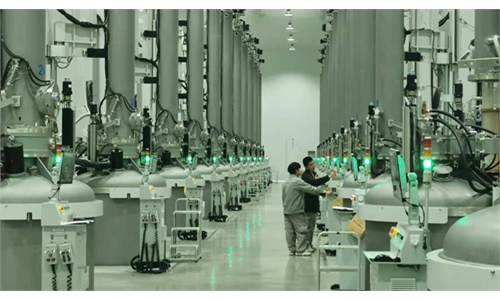
A scene of Shenzhen Photo: VCG
Editor's Note:
As the Chinese economy, along with the entire global economy, faces considerable challenges in recent years, some Western officials and media outlets have stepped up their long-standing smear campaign against the world's second-largest economy. They cherry-pick information and even distort facts to hype various specious narratives such as "Peak China," while turning a blind eye to China's considerable strengths and vast potential.
As part of the Global Times' multimedia project to set the record straight, the opinion page is publishing a series of in-depth interviews and signed articles with economists, experts and scholars from different countries who share their views on the prospects of the Chinese economy and debunk Western rhetoric.
In the first article of the series, Global Times (GT) reporter Su Yaxuan talked to Helga Zepp-LaRouche (Zepp-LaRouche), the founder of the German-based think tank Schiller Institute. LaRouche pointed out that negative rhetoric regarding the Chinese economy reveals Western fear that they are losing what they perceive as "systemic competition."
GT: China is in full swing to advance high-quality development. In your opinion, what development philosophy has been reflected in the "high-quality development" proposed by China, and what achievements have been made?
Zepp-LaRouche: It is evident from the success of the economy that China has discovered the key to a scientific-economic method that leads to continuous qualitative growth. This key is the continuous injection of scientific and technological innovation into the process of production.
Western critics are usually so ideologically biased that they tend to confuse monetary gains with the actual physical growth of the economy and judge the success of an economy by the numerical value of money as such. Some investments can have spectacular returns in the short term, but turn out to be disastrous for the fundamentals of the economy in the medium or long term. That is why China has taken many steps to curb and eventually get rid of speculation, both domestically and internationally.
My understanding of "high-quality development" is that by putting the cultural creativity of the entire nation at the center of the economy, it unleashes that quality in people, which is the source of scientific and technological progress.
When one travels to different cities and regions in China, one also sees another reflection of this "high-quality development" in the obvious effort to build a beautiful China by both creating a harmonious meshing of human requirements with nature and the application of the rich achievements of Chinese culture.
GT: In a period of global economic turbulence, what significance do you think China's high-quality development model contributes to the stability of the world economy?
Zepp-LaRouche: It has proven to be an anchor of stability. Since its core is the buildup of physical production and modern infrastructure - like the 40,000 km fast-train system, not to mention the other frontier technologies such as 5G, AI, robotics, etc. - the role of China as an anchor of stability will only continue to grow.
By contrast, Western countries have demonstrated a wanton neglect of infrastructure investment and maintenance. Rather than mobilizing the necessary state-directed stimulus programs to reinvigorate hard and soft infrastructure, a frenzy to militarize the economies has taken over European states and the US, which has fateful precedents in the European history of the 20th century.
While for the collective West, the concept of diplomacy seems to have been eradicated from memory, President Xi Jinping's various diplomatic concepts, such as the idea of a global community of shared future, in combination with the Global Security Initiative, Global Development Initiative, and Global Civilization Initiative, offer a potential framework to overcome the present extremely dangerous trend. I am optimistic that there are many forces within industry, small- and medium-sized enterprises the scientific community, and civil organizations that would respond positively to a Chinese vision of how the collective West could cooperate with the countries of the Global Majority rather than being pulled into a military confrontation between NATO and Russia, which could potentially end civilization.
GT: What kind of implications does China's economic success have for Global South countries?
Zepp-LaRouche: China is leading in the application of AI, smart cities, and many other state-of-the-art technologies. Looking at this development not from the standpoint of geopolitical competition, but from the standpoint of the advancement of the human species in universal history, it is without question that China is providing a unique civilizational contribution by lifting not only nearly a billion of its own population out of poverty, but also by offering assistance to the countries of the Global South to do likewise.
The fact that China has extensive cooperation programs with large numbers of countries in the Global South means that the drive of these countries to finally overcome the era of colonialism is now a realistic perspective. These cooperation agreements between China and the countries of Africa, Asia, and Latin America mean that they can leapfrog to state-of-the-art technologies and raise national income in the foreseeable future.
GT: China seeks to achieve a GDP growth rate of around 5 percent for 2024. Are you confident in this target?
Zepp-LaRouche: If one looks at the Chinese domestic market, there is reason to be confident that this growth rate will be reached.
GT: What are your thoughts on the West's persistent negative rhetoric regarding the Chinese economy, such as the "China collapse" or "Peak China" theories? Why does the West hope to use these theories to smear China?
Zepp-LaRouche: The undeniable magnitude of the Chinese economic miracle in reality worries some of the establishments of the West. Underneath, they fear that they are losing what they perceive as "systemic competition."
In focusing on its physical production, China is creating real physical assets, and by making continuous innovation the driver, China has essentially been able to avoid cyclical developments of the economy. The West, meanwhile, sits on an essentially unpayable debt bubble.
Some establishments think that control of the narrative is the way to maintain political control. They feel that they have to blacken the image of China.
Most of the foreign policies of the West have caused a gigantic blowback, from interventionist wars to sanctions to the weaponization of the dollar. Instead of aligning with the "democracies of the rules-based order," many countries in the Global South have turned to China and the BRICS for a win-win result. For the first time in the last 600 years of colonialism, they have the opportunity to overcome poverty and underdevelopment through cooperation with China. In reality, there is zero chance that China can be defeated by this "China collapse" theory.



